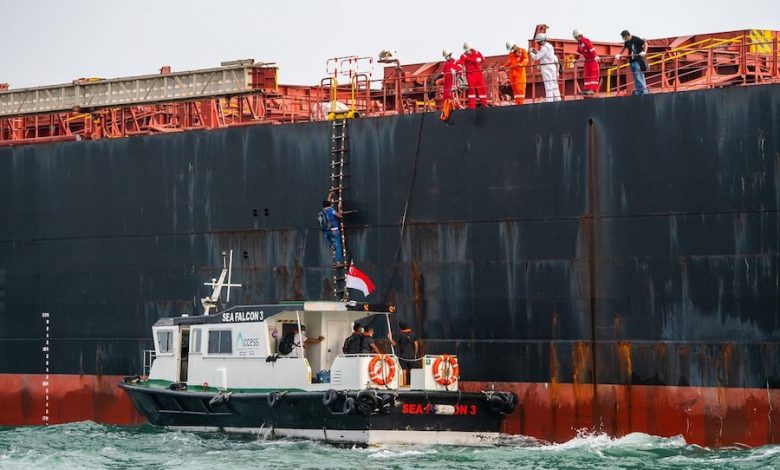Charterers playing ‘pass the parcel’ with crew changes

Charterers are now discriminating against ships which have long-serving crew onboard rather than risk their cargo being delayed by crew change deviations, warns one crewmanager today.
Roger Storey, managing director of CF Sharp Crew Management, Singapore, reported he has been advised of charterers who are stating in their contracts that vessels should not have any seafarers who have been serving onboard continuously for more than 12 months. If such crewmembers are present the charterers do not select that vessel for hire.
The charterers just don’t seem to care about anything but their cargo
“Why? Because of the risk that the vessel gets detained and their cargo gets stuck,” he explained in conversation with Splash.
Storey, whose company has successfully repatriated more than 12,000 crew members during the pandemic, said: “Shipowners are in the firing line and crew are pawns in this game. The charterers just don’t seem to care about anything but their cargo at present.”
Splash reported earlier this month how charterers are increasingly requesting for a ‘no crew change’ clause to be inserted into charter parties, demanding owners pick up the cost related to deviation and time lost.
Charterers have been urged repeatedly to play their part in ensuring crew get home.
Speaking with Splash TV last month, Francesco Gargiulo, the CEO of the International Maritime Employers’ Council (IMEC), said there has been little appetite on the charterers’ part to share in the problems that the industry is facing regarding crew changes.
Shipping organisation BIMCO has developed a deviation clause, which seeks to share some of the financial burden of getting crew repatriated during the coronavirus pandemic.
“The sad news is there’s been very little uptake of that clause because there is little appetite on the charterers’ part to share in the problems that the industry is facing,” said IMEC’s Gargiulo in a recent episode of the Maritime CEO Seafarer Leader Series.
CF Sharp’s Storey lamented today: “It is a sad that crew change is the new pass the parcel game with governments who rely on seafarers for the importation of cargo needed by their populace, and now by cargo charterers who rely on seafarers to transport their cargoes.”

Owners should organise themselves before putting the vsl for charteing. Charterers are making money without putting any efforts. Simple way is to increase the freight rate. There is a saying every dog have his day.
Unfortunately, it is a chaterers market and they will take this opportunity to gain advantages as much as they can.
Clever and competent charterers should personally manage their own fleets, and all third-party crew managers should be fired.
Amazingly one sided article.
The main reason charterers don’t want crew longer than 12 months is because a) they don’t want the ship arrested in trading certain countries which impacts everybody in the supply chain and b) they are trying to “encourage” owners not to abuse their crew beyond a certain limit. It is actually designed to force good behaviors even at a cost. Fact remains that crew are employees of the owners and normally such costs are intrinsically connected to them. Should charterers participate in these costs? Out of solidarity, yes they should and do. Owners and charterers can work together to make plans for crew changes depending on where the ship is and what direction the ship is going with minimal cost. The key is good open communication and I have seen it happen the vast majority of times in my experience.
But let’s please have a more balanced view and maybe interview a wider spectrum of stakeholders.
We had a case where a time charterer was reluctant to agree to any suggestions by owners to make a modest deviation to the Philippines on a China Australia voyage for a crew change, where changing crew at either end of the trip was simply impractical, dueceg to government regs, and lack of flights to enable conformity with them.
The reputable owners and managers want to do crew changes but the difficulties lie with port states who will not facilitate crew changes, where the chances are that seafarers are less likely to have COVID 19.
Well as a seaman and as someone who experiences this problem I approve that article as correct 100%…we ve been trying to sign off for months.. Port authorities arranged for my crew repatriation until the charterers showed up and involved and try to make problems… The truth is that Noone cares about the crew.. Nor owners… But since they are obliged to sign them off by rules the only problem out of nowhere came from the charterers.. Maybe the crew is not their problem as you say.. But maybe that crew is important to keep the safety of life at sea.. Pollution etc.. At least they should care about that.. But if they have everything under incurance we understand they don’t care at all even for that… So by adding clauses like “no crew change” in this critical periods for crew changes they are the main reason crew changes are canceled… Or about to… I face that daily… I deal with this daily and for months… And I m talking about crew changes already arranged by authorities at intermediate ports where countries accept crew changes